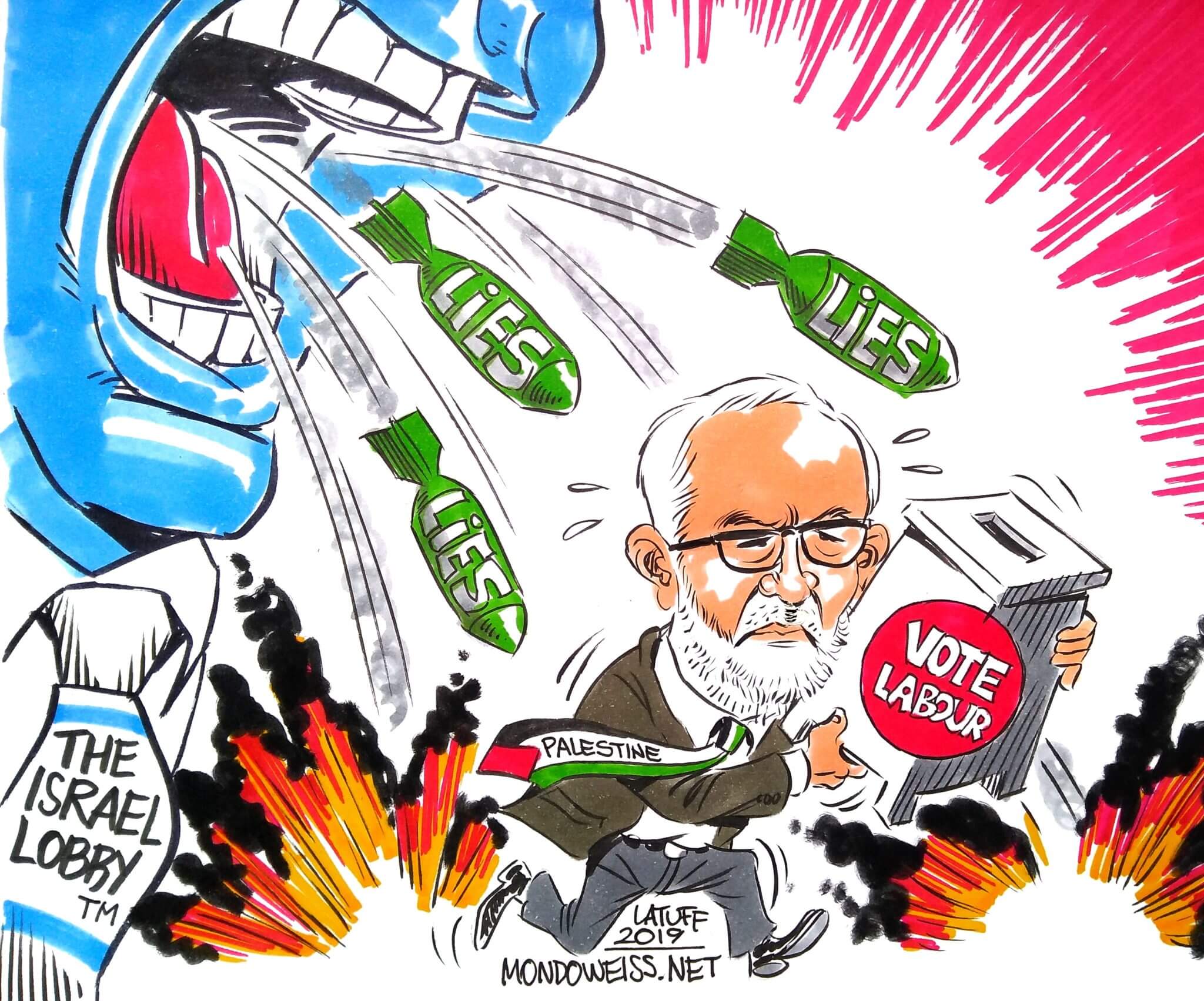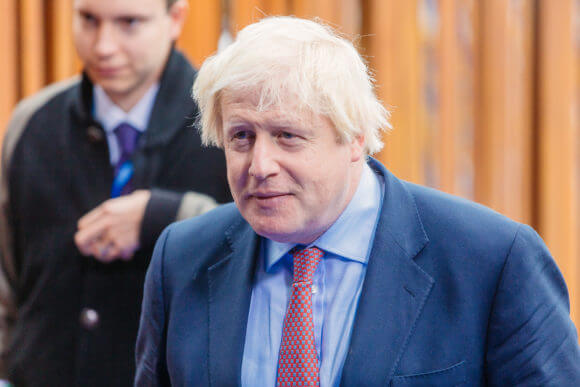I can hardly believe what I’m reading. Defenders of liberal values, human rights, and inter-cultural coexistence are seriously wavering when faced in upcoming UK elections with the choice between a government led by Jeremy Corbyn, who is far from perfect but has repeatedly declared his opposition to ethnic and racial discrimination of all forms, and Boris Johnson, who openly mobilizes racism in his campaign and has made Brexit into a programmatic piece of anti-immigrant policy. It is understandable that some people take other values into political consideration—of course staunch believers in the free market and hard Brexit at all costs have plenty of reasons to support Johnson. But how is it possible that, on the question of anti-racism and cultural co-existence, anyone could see anything near equivalence between the two, much less entertain the possibility that Johnson’s Tories might be the more tolerant option? The fact that such thoughts have become imaginable at all reveals serious problems with the way the entire debate has unfolded.
It would be nice if those of us who don’t live in the United Kingdom could write this whole affair off as a merely local affair, yet another sign of British peculiarity. But these peculiar discussions are projected into other spaces, repeated, and taken as models which others use to promote a rigid and conservative understanding of Jewishness elsewhere in the world, rushing to brand their opponents as anti-Semitic rather than engaging with them in meaningful debate.
Corbyn deserves criticism for his shortcomings. He’s spoken in defense of a mural that employed anti-Semitic imagery, which, if we accept his account, he really should have looked more closely at. He has associated with problematic people, and he’s apologized for calling them his “friends.” To be honest, I’m not really that troubled by the fact someone might have racist friends—maybe I’m too forgiving, but given the hate-filled world we live in, it seems a bit hard to entirely avoid being friendly once in a while with hateful people, especially if we call for dialogue between those on opposite sides of political conflicts. Still, it would be reasonable to criticize Corbyn’s political tradition, whose critical focus on Western imperialism has sometimes led it to jump too quickly to the defense of anti-imperialists who don’t share Corbyn’s own universalist antiracist premises. Certainly we can fault some on the left, including some Corbyn supporters, for their tendency to personalize political issues rather than recognizing their structural nature, blaming bankers rather than the banking system, the global elites rather than neoliberal globalization, and sometimes falling into conspiracy theories of various sorts. Even when Jews are explicitly absent from such conspiracies, we can easily identify the form of classic anti-Semitic narratives, which risks opening the way for anti-Semitic content.

But as David Feldman has written, this isn’t the same as having a party infested with self-conscious Jew-haters. The way to combat this problematic politics is not by name-calling, but by developing new forms of political understanding and political practice. So a sober debate would have been in order and might have helped the Labour Party to articulate a set of antiracist positions more adequate to its own declared aims. But as anyone who’s followed British politics over the last few years knows, the occasion for sober debate never came. In its place is a vicious cycle of incrimination, followed predictably either by awkward silence or angry self-defense. There seems to be no room for discussion of nuance, circumstances, or complications, any of which are seen by accusers as further evidence of being soft on anti-Semitism, or even of promoting it. Even when the initial accusation is forgotten, the talk about the accusation is enough to keep the accusation alive in the public mind.
Compare Corbyn-led Labour to the Tories under Boris Johnson. Johnson has positioned himself as the face of a post-Brexit anti-immigrant utopia. He’s repeatedly made out-right racist remarks, rarely showing the slightest remorse. Even if one imagines—without any concrete evidence, it seems—that Corbyn harbors some conscious, personal distaste for Jews, it’s clear he gains nothing politically from public expressions of anti-Semitism, and he and his party are trying, however unsuccessfully, to eliminate anything that could be perceived as anti-Semitic from anything associated with them. There is no reason to believe that they would give up on these efforts in any government led by Corbyn, and they might even learn from past mistakes. By contrast, Johnson has built his political career on racist appeals to voters, and—whatever his personal views might be—if voters reward his efforts by a new premiership, he would seem to have everything to gain by continuing to play up racism. Even if Johnson has generally refrained from pandering directly to anti-Semitic voters, can anyone seriously entertain the possibility that this atmosphere of government-encouraged racism would be good—or even a lesser evil than Corbyn’s Labour—for Jews?
Why, then, has an alleged Jewish dread of Corbyn been at the top of the news for years, while Johnson—the actually racist, actual prime minister—appears as an afterthought? Nicole Lampert, in her Haaretz op ed from November 26, hits the nail on the head: “Every other day there’s a story,” she writes, about alleged anti-Semitism in the Labour Party. We’re surrounded by stories. A few stories tell of clear-cut anti-Semitic slurs. More of them relate complicated cases, in which participants insist they misspoke, or employed misplaced irony, or were unaware of the anti-Semitic associations of tropes they used. But the point is that when anti-Semitism takes place in the Labour Party, it’s news. Labour, after all, has historically fought against anti-Semitism, and as a whole it continues to call for fighting bigotry in all forms. So anti-Semitism in Labour is shocking, and it fits with the narrative construction of Corbyn as a bogeyman who’s come to overturn that great tradition. But when anti-Semitism takes place in the Conservative Party, it isn’t news. The Conservative Party was born of racism, and under Johnson’s leadership today it is only strengthening its role as the party of White, Christian privilege. What else is new?
Yet there seems to be no clear statistical evidence of a rise in Labour Party anti-Semitism under Corbyn’s leadership, while other polls, including an oft-cited Jewish Policy Research report from 2017 and the Campaign Against Antisemitism’s Antisemitism Barometer, show rather unsurprisingly that anti-Semitism is considerably more prevalent on the right than on the left. If such statistics offer little solace to those like Lampert who live in terror of Jeremy Corbyn, perhaps it’s because, like Lampert writes, “in the lead up to general elections on December 12th, ‘the Jews’ are everywhere.” Yes, “the Jews” are all over the news—not because large numbers of anti-Semites want to complain about Jews, but because large numbers of reporters have chosen to write articles about Corbyn’s alleged anti-Semitism. In fact, the number of articles about anti-Semitic incidents themselves is miniscule next to the number of articles about articles about what someone said about Corbyn’s connection to those incidents. Anti-Semitism itself seems to frighten people less than all the talk about it. We hear day after day about someone accusing Corbyn of anti-Semitism, day after day about someone commenting on how someone else accused Corbyn of anti-Semitism, day after day about Corbyn responding to accusations or choosing not to respond (either way it’s news). Even when Corbyn explains how he is trying to combat anti-Semitism, the headline is “Corbyn resists calls to apologize to Britain Jews.” Apparently, anything less than complete agreement with and prostration before his critics is taken as insensitivity toward all Jews.
Corbyn’s critics have a penchant for speaking, as Lambert does, of “the Jews” as a single body, united in its fear and hatred of Corbyn. Do we really want to put Jews into a situation where “the Jews” supposedly think this and that, and where opponents’ arguments against these specific opinions are treated, without hesitation or reflection, as attacks on “the Jews”? The space for political discussion disappears, as political opinions become ethnicized, standing in for entire peoples. But worse: as the debate over anti-Semitism has descended into name-calling, apparently sincere defenders of “the Jews” have associated Jews—not as individuals holding various opinions, but as a unified group—with strident opposition to a wide range of progressive policies. Any political tendency, including Corbyn’s, should face critics, but do we really want criticism—especially such poorly argued criticism—to be embodied in an entire cultural group? Do we really want to encourage people to argue back, not against specific opinions, but against “the Jews” as such? Please, count me out. (And I simply don’t care what percentage of Jews claims to be in agreement on these issues. It wouldn’t be the first time a majority was wrong.)
To be fair, most of the articles about Corbyn’s alleged anti-Semitism do not directly propose voting for Johnson’s Tories. But it’s hard not to read them as pointing in that direction, or at least offering justification for those who might hold their noses and make such a decision. The moral admonishment of Johnson pales in comparison to the dread of Corbyn. How have we come to the point where apparently tolerant liberals are more frightened of a somewhat inconsistent antiracist than of a consistent racist? That this kind of moral calculus might be spreading beyond the borders of the UK, affecting us everywhere—this, frankly, is what truly terrifies me.



Anti Semitism has been weaponized to the extent that just 8 members of the Labour party have been expelled out of a total membership of over 500,000 which if my math is correct is just 0.002%.
“Corbyn deserves criticism for his shortcomings. He’s spoken in defense of a mural that employed anti-Semitic imagery, which, if we accept his account, he really should have looked more closely at. He has associated with problematic people, and he’s apologized for calling them his “friends.”
“It was a given in all the mainstream reporting that the mural was blatantly anti-semitic, portraying “Jewish bankers” seated around a Monopoly-style game board supported on the backs of workers. Mear One, however, insisted instead that it was a radical critique of capitalism, and that the “bankers” portrayed were caricatures of real-life capitalists, most of whom were not Jewish”. https://orientxxi.info/magazine/anti-semitism-orchestrated-offensive-against-jeremy-corbyn-in-the-uk,2446
In my opinion both Hezbollah and Hamas are legitimate resistance organizations fighting an illegal occupation, under International law both have the right to use force to end the occupation.
Here is Peter Beinart’s reading of the Corbyn controversy and the Corbyn versus Johnson comparison. When the only voices are the right wing Zionists like Mirvis and the anti Zionists featured here, it is useful to have Beinart, who is attempting to analyze Corbyn’s failings and the progressive failure to call him out for his failings. https://forward.com/opinion/436159/yes-jeremy-corbyns-record-on-anti-semitism-is-bad-but-his-critics-are/
You are rather harsh on Corbyn.
And you say nothing of the severe anti-Palestinian racism which is inspiring much of the smears against Corbyn. These are racist slurs, and it is no surprise that the people employing them support a racist like Johnson.
The campaigns against Corbyn and Trump are quite similar. In both cases the establishment , secret services and the media are engaged in an a broad propaganda campaign to cultivate groupthink against those targets. In groupthink the mutual confirmation is strong enough to make the most preposterous claims credible to intelligent people and it would be unusual for the manipulators to stay on the outside of the bubble. In both cases the antirussia campaign is intense and the ‘Russian stooge’ claim has been used(and in the US it’s been readied against Sanders, Gabbard and Stein) but in the UK the focus went more to the ‘antisemite’ claim.
Both Corbyn and Trump are cases of the mainstream losing narrative control over a large part of the public, but while Corbyn is a decent progressive humanitarian who presents a threat to many interests , Trump is merely a televangelist version of Boris Johnson.
Here’s a very recent Russia link: Corbyn exposes the nefarious privatisation plans for the NHS. Deep state reacts with claims that it’s a russian plan https://thegrayzone.com/2019/12/08/us-uk-military-intelligence-apparatus-destroy-jeremy-corbyn/
Shame!!! on the Zionists, wherever they reside. I reserve the right to be critical of how Palestinians are being treated without being smeared with the “anti Semitism” nonsense. Anti Semite: it sticks better than any glue on the market.